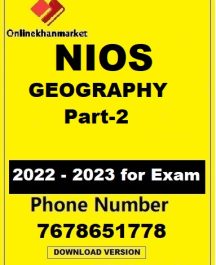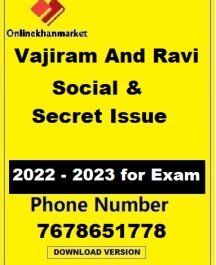Description
Here we mention about all the information related to GENERAL SCIENCE AND TECHNOLOGY FOR UPSC.
GENERAL SCIENCE AND TECHNOLOGY FOR UPSC
Science & Technology is one of the subjects included in the civil services examination. Many questions circling this subject have been asked both in UPSC Prelims and Mains. To help aspirants prepare for IAS Exam, this article will provide them with the pdfs of UPSC notes on Science and Technology. Science and Technology is part of the UPSC Mains Syllabus (GS III). Also, science subjects like Botany, Chemistry, and Biology are part of the optional subject choices in the IAS Mains exam. Subjects with a scientific base are high-scoring, yet they often pose a challenge to IAS aspirants, as students find it hard to make notes balancing both static and dynamic topics/issues in the news.
GENERAL SCIENCE
A degree in general science will open up endless career paths and possibilities. Your analytical, investigative, and technical skills will make you an excellent candidate for roles in education, research, healthcare, conservation, and more.
For example :
Biotechnician: Biotechnology is a science-driven industry sector that uses living organisms and molecular biology to produce healthcare-related products. Biotechnology companies also develop therapeutics or processes (such as DNA fingerprinting). Biotechnology is best known for its role in medicine and pharmaceuticals, but the science is also applied in other areas such as genomics, food production, and the production of biofuels.
Environmental scientist: Environmental scientists analyze a wide variety of environmental problems and potential solutions, including alternative energy systems, pollution control, and natural resource management, and maybe employed by government, industry, universities, or nonprofit organizations.
Forensic scientist: Forensic scientists collect, preserve, and analyze scientific evidence during an investigation. While some forensic scientists travel to the scene of the crime to collect the evidence themselves, others occupy a laboratory role, performing analysis on objects brought to them by other individuals. Still, others are involved in the analysis of financial, banking, or other numerical data for use in financial crime investigation, and can be employed as consultants from private firms, academia, or as government employees.
Conservation scientist: Conservation scientists recognize the importance of integrating ecological and human systems. Even where humans are absent from particular landscapes or regions their activities will have some influence on the ecological functioning of those places. Thus, conservation science involves the study of both natural and social sciences and their inherent linkages.
Geoscientist: A geoscientist, is a person studying Earth or other planets using Earth science. A geologist is a scientist who studies the solid, liquid, and gaseous matter that constitutes the Earth and other terrestrial planets.
Secondary school teacher: a school intermediate between elementary school and college and usually offering general, technical, vocational, or college-preparatory courses.
Research scientist: Research scientists work in almost every area of science imaginable. They plan and carry out experiments and investigations in a range of areas, including geoscience, medical research, meteorology, and pharmacology. These are broad research areas; a research scientist will most likely be working on a much more specialist topic, such as gravitational waves or stem cell biology.
Chemical technician: Chemical technicians conduct analytical or lab-based tests on a variety of chemicals, materials, or products. They conduct testing for environmental impact, quality assurance, regulatory adherence, safety inspection, or sample testing.
TECHNOLOGY
Technology is the application of scientific knowledge to the practical aims of human life or, as it is sometimes phrased, to the change and manipulation of the human environment.
Science and Technology are considered to be the abstract subjects that follow no fixed pattern or syllabus for both UPSC CS Prelims and Mains. However, the past year’s trend analysis clearly shows that questions on this subject are analytical. Hence, the following strategy will be useful to kickstart your science and technology preparation for UPSC:
Strengthen your foundation: It is very important to have a crystal clear understanding of the basic concepts of the topics mentioned in the syllabus. Reading NCERTs from Class VI to X will introduce you to the basics of the subject.
Previous Year Questions: Since this particular subject is boundless, you need to stick to the syllabus while preparing for the Science & Technology portion. Hence, always keep a copy of the syllabus in front of you and check if the topic is mentioned in the syllabus.
Current Affairs: It has been observed that questions about current developments are often asked in UPSC CS Prelims as well as Mains. Hence, leverage editorials from the Hindu and the Indian Express to their fullest potential. Make small notes of the pointers for any recent development in the field of science. It includes space exploration missions, advancements in Artificial Intelligence, medications, reports surrounding the spread of diseases and their containment using scientific methods, etc. Further, you should expect a lot of questions from Science & technology this year owing to the ever-changing advancements surrounding COVID crisis management. Hence, you should regularly read the reports on vaccine testing as well as the virus spread across the globe.
Mock Tests: Solve a lot of mock tests and sectional tests. You can purchase Science & Technology Question Bank for Civil Services Examination by TMH publication for practicing the questions for Prelims.
Practice answer-writing: For mains, practice answer-writing as much as possible and get your answers evaluated by your mentors. For science & tech, it is important to follow a diagram-based approach as well as add factual information for making your answers more substantive.




Reviews
There are no reviews yet.